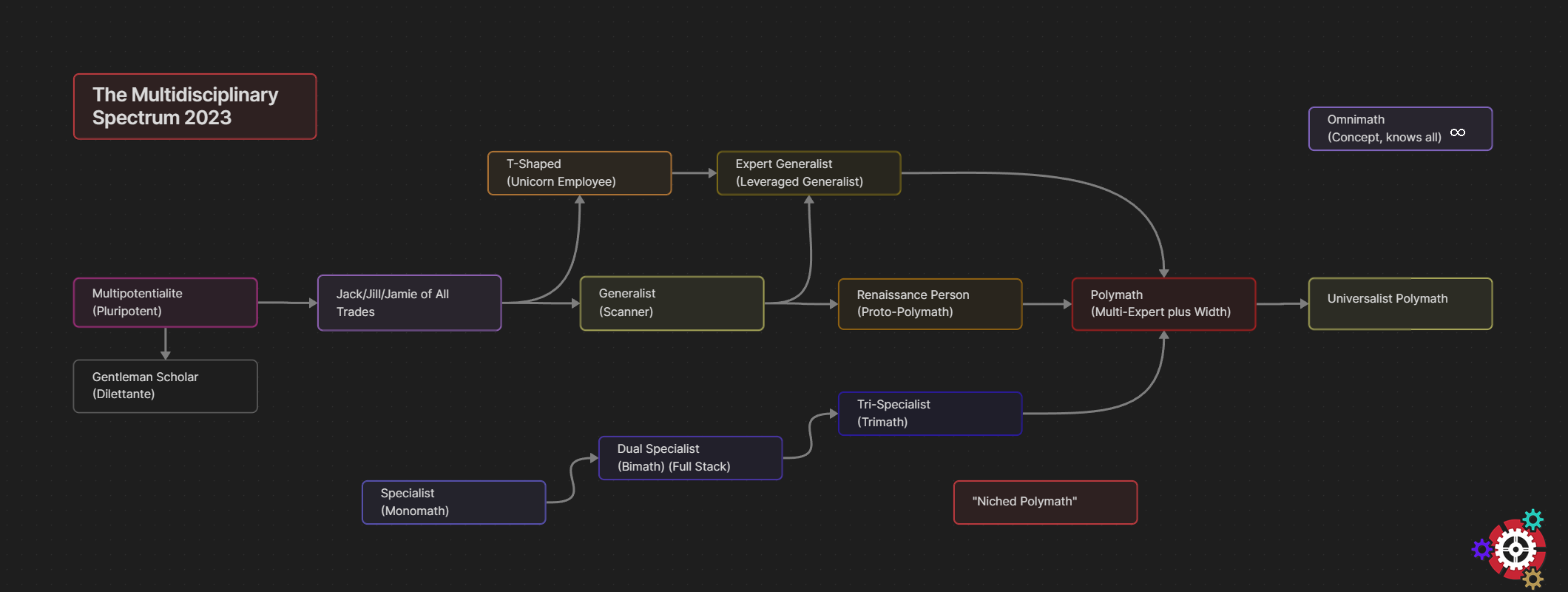After seeing almost everything the internet has to offer (up to this point) on polymaths and generalists. I want to tackle this seemingly simple, yet overtly complex question.
Most of the researchers in polymathy agree that it is 3 or more areas of knowledge. Combined with an insatiable curiosity. That is a solid baseline, that I think we can build off of, and one that at least cuts out other lower items on the Multidisciplinary Spectrum.
Reaching the level of polymathy isn't an ego thing, but rather something to be able to explain the dynamics of having multiple expertise. When you are literally an expert in multiple fields, regardless if they are similar or not, then it can be difficult to explain to others what you offer.
For Context here is the Multidisciplinary Spectrum:

Quantifying Terms on the Spectrum
This series, the Journey to Polymath, used to be known as "Level up to Polymath". Each term acting like a sort of stepping stone or level towards polymathy, even specialization.
I wanted to share that mindset with you because I think anyone can become one, at least eventually towards the end of their life. While some people like myself discover they want to become one early on in life, and can work towards that. Other people may discover it down the line. Now let's get to the numbers, while Multipotentialite for example is the POTENTIAL to do many things, there will be a number of people who identify as one. That would technically be more closer to a generalist when it comes to level of knowledge.
Each term represents a point of where someone might be based on their width (number) and depth of level of knowledge.
Leveling up to Polymath
If multipotentialite is the start, where we have the potential to do many things. Any number of people can be one by that definition, although for most multi's it is more of natural way of thinking. Let's move on to your first split:
You can either juggle areas of knowledge, or focus on one. Taking a specialist or jack of all trades approach. Neither is better than the other, but you'd probably see the fruits of your labor most likely with the specialist path.
The Jacks of all trades are often a lot more common than you might think, and some folks who dabble like that; They find something they like most, and then choose to specialize. While have a wide range, they have one main one as well. Thus the T-shaped person split happens.
We have three paths going at this point: the spinning many multiple plates, spinning some plates with a main one in the middle, or the singular trench. The next step is just taking those paths a step further. Given time then you have a deeper level of knowledge in every area you contain (most likely, unless you dropped some).
A specialist might choose to go a different path once they read grad school/phd, or choose another specialty to set them apart. I.e. the "Bi-math" or dual specialist.
The jack of all trades carries over most of their areas of knowledge, and while one or two may have been dropped. Either due to a loss of interest, or time opportunity cost, they kept most of their areas of interest. Thus upgrading from a novice level in each, to more of an intermediate level in each.

The T-shape or generalist both can lead to the same outcome. They essentially both have kept up multiple width of skills, while pursuing a specialty (just the generalist may have been more split between areas). If a generalist decides to narrow down like the T-shaped, then either becomes the leveraged "Expert Generalist". Having a specialty like a Specialist, but the width of many intermediate fields as well.
Here is where the nuance occurs, and why it is difficult to truly define what a polymath is. Then thereby making it hard to distinguish what it takes to become one.
The remaining terms on the Spectrum
While the omnimath purely theoretical, think almost omnipresent, it is there just to have an endpoint essentially. Ignoring that we are left with the Renaissance person, which is hard to define because even in the Italian Renaissance there was multiple meanings. Not to mention there have been many vastly different renaissances in human history.
I just see it as a further along generalist, that has not hit the level of polymathy yet. True expertise or specialty in 3 or more areas I mean. Perhaps more of a journeyman level.
The Tri-specialist is essentially three areas of expertise like a polymath. Though polymath is 3 or more. Not to mention a tri-specialist presumably is either journeyman, or MAYBE expert level. However with time opportunity cost it is hard to say. The difference between the two of a tri-math vs polymath, is the much or many (poly) part. Where the trimath lacks the innate curiosity to extend beyond their 3 areas, or having a width like a jack of all trades. Which I consider a polymath having that width.
The "Niched Polymath" is something I came up with, but others call it something like a closed group or something along those lines. Think like multiple areas of knowledge, but they are all very close together in subject matter. That you don't really get a whole lot of cross-disciplinary contamination that you'd want from being fully multidisciplinary. I sometimes call PolyInnovator a niched polymath in my writings, but that is just conjecture.
Well we didn't really answer the question, what does it take to be a polymath? In the end of this post I hope this gave you some clarity though on the pathway to what it means to be a polymath.

![Official Website for Dustin Miller PolyInnovator [LLC]](https://www.polyinnovator.space/content/images/2025/03/polyinnovator-logo-2024.png)











